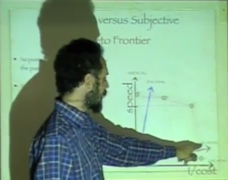
Voting, not as usual: using a human-based genetic algorithm to answer an open question
Speaker(s): Dr Pietro Speroni di Fenizio
Organiser: Dr Jason Noble
Time: 09/11/2009 16:00-17:00
Location: B59/2
Abstract
When a community needs to take a decision, the democratic way to proceed is through voting. Voting itself can take many forms, and a wide-ranging theoretical literature discusses the various possibilities. Most of the available forms of voting assume that the possible options available are clear from the beginning, and that each vote is equivalent to every other (and thus that we can sum them up). Given these assumptions it follows that the other participants in a voting process are seen as enemies, or at least as people that we need to convince to come around to our side of the issue. In this talk we are going to give an example of a system that does not follow these assumptions. Using a human-based genetic algorithm, coupled with an algorithm that extracts the Pareto frontier from each generation, we are going to see whether a community can reach agreement on an open question that is given to them. The research was inspired by and falls inside the remit of previous work done on e-government systems and collaborative governance; i.e., the search for an online service that would permit communities of varying sizes to self govern themselves through the internet. The system is available online, and (if possible) an experiment will be set up during the talk using the audience members as participants. So, please bring your laptop if you can.
After the Ecal poster, I gave a talk in Southampton and Coimbra on Vilfredo. This was probably the first talk I ever gave on Vilfredo. The abstract presented here is from the Southampton talk. While the video is a mash up version of the two talks.